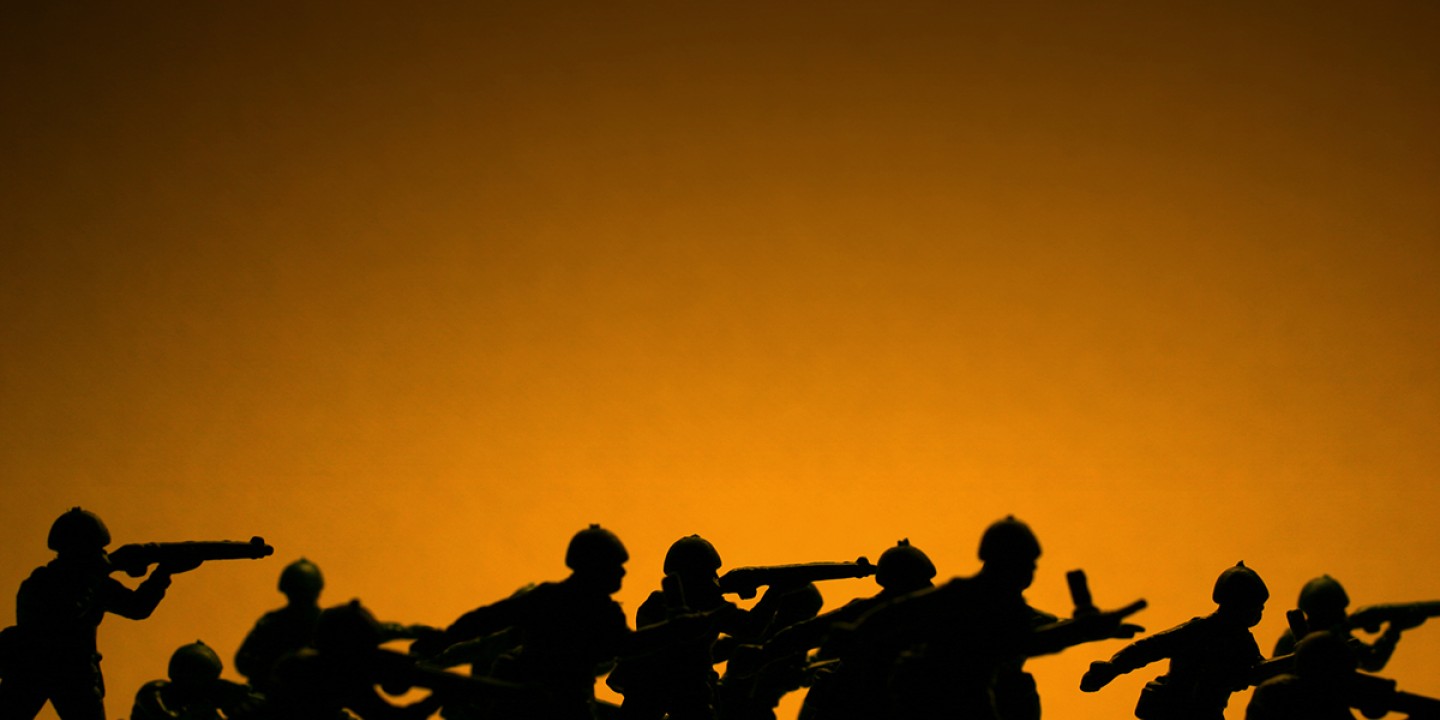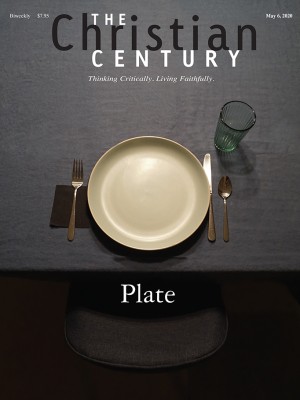Are we really “at war” with the coronavirus?
The language of war garners collective resolve. But that’s not all it does.

The mind tends to wander when the body shelters in place. Lately, mine has been returning to Umberto Eco’s The Name of the Rose, a postmodern murder mystery set in a 14th-century Benedictine monastery. The main detective, William of Baskerville, tries desperately to connect wildly disparate dots in order to find some pattern, some overarching meaning, among widespread destruction and death. In the end, he fails. No coherent pattern emerges, only coincidence and confusion alongside a few simple acts of kindness.
How much meaning can and should be found in a pandemic that has strewn indiscriminate fear and loss across the globe? Or better, what kind of meaning should people be looking for? According to the medical doctor and ethicist Lydia Dugdal, our country currently lacks a “common existential narrative,” a shared story that can illuminate the meaning of widespread suffering and death. I think she’s right, with one exception—the meaning we find in war.
Read our latest issue or browse back issues.
President Trump has declared COVID-19 the war of our time and decreed himself a wartime president. Joe Biden and Bernie Sanders beat him by a number of days, as each compared confronting this virus to the waging of a war. French president Emmanuel Macron was one of the first and most direct. “We are at war,” he repeatedly declared when ordering his citizens to stay in their homes.
War language is the language of power. After early forays into glib optimism and empty assurances, politicians are now invoking war to exhibit clear resolve, to demonstrate that they are girding their loins to prepare for battle.
Yet much of the work ahead of us will be the far less unilateral work of patiently waiting out this infectious storm, learning to care for the infected and affected, and grieving the loss of loved ones. There is much that we will need to bear and survive rather than conquer and control. War language may be not only irrelevant to these efforts but also rather counterproductive.
I think of the week immediately following the attacks of 9/11. There was widespread fear and confusion, but there were also countless makeshift memorials, solidarity vigils, and instances of people spontaneously helping strangers. There was an affectionate, palpable patriotism of the most profound kind. It was as if the whole nation were sitting shivah, purposely persisting in our grief while we waited on one another.
That week was incredibly meaningful, whether we were watching images on television or roaming New York like a giant prayer labyrinth. But even if it was pregnant with meaning, none of it meant any one thing. Because we couldn’t situate 9/11 within a well-defined framework of understanding, we didn’t know what it meant, which became part of the very enigma that we were so devotedly circling around.
And then we declared war. As journalist Chris Hedges puts it, war is a force that gives us meaning. Americans know war; we know how to make sense of things when we are at war. We honor the fallen, pray for soldiers, hang flags, and supplement the national anthem with “America the Beautiful,” color guards, and flyovers.
President Bush’s declaration of war had the almost magical effect of transforming victims into heroes, our passive mourning into active resolution, and our collective dread before God-knows-what into a clear mission to rid the world of evil. There was some collateral damage; for example, most of the international community collected their things and quietly departed. But by and large, to be at war was much more understandable and reassuring than the meaning-soaked yet meaningless grief from which we were emerging.
For the record, I hope that we beat COVID-19, kicking the crap out of each small set of genes enclosed in fatty lipid molecules and armored with protein spikes. At the same time, I’m concerned about the collateral damage to our collective character and individual dispositions that might result from using the language of war.
The language of war mostly carries out its mission in garnering collective resolve and justifying the moral righteousness of those engaged in battle. But sometimes it carries out other missions too.
Those who have engaged in warfare know that it’s easier to kill people if you’ve first dehumanized them. From Vietnam to the War on Drugs, we’ve seen this play out through the deliberate use of racial slurs. Trump has insisted on calling the coronavirus that causes COVID-19 “the Chinese virus.” If attacking a virus depends on its racialization and conquering an enemy requires dehumanization, it’s a short step to demonizing all Chinese people.
The language of war can also cause us to focus excessively on the future without attending to how we’re living in the present. Theologian Deanna Thompson was diagnosed with stage IV cancer more than a decade ago. In Glimpsing Resurrection, she writes about how those living with cancer are often cast in the role of warriors, enlisted to do battle with their cancer (whether they like that metaphor or not). She suggests setting aside the war language in order to ask what it would mean to negotiate life with a serious illness, to live well with loss.
Following Thompson’s lead, we might ask: What will it mean for our country and world to live well with this pandemic? Will we be patient and kind? Will we be able to truthfully accept and faithfully bear this tragedy, even as we try to conquer it? How will we care for those who cannot be cured—a question made painfully difficult by the six or more feet of space that separates the dying from their families? How well will we grieve—privately in our homes, locally in shifts of ten, and collectively as a human race?
Conquering the virus or going down fighting are not the only meaningful stories available to us as we try to make meaning in this pandemic. Christians have a number of scripts for living well with loss. They’re there in the raw lamentations of Job and the Psalms, in Jesus’s difficult concession to death culminating with his cry from the cross, in Ash Wednesday’s acceptance of mortality and the self-examination that follows throughout Lent.
For its part, Chinese culture cultivates “valley spirit,” balancing an aggressive, masculine Yang with supple, feminine Yin. Indeed, according to Daoists, the most powerful action is spontaneous nonaction, or wu wei—the way of water, which cuts through rock by yielding so masterfully to it.
In a journal that I have been keeping, I noted the beauty of the first day of spring. The sun came out late in the day, its light dispersing throughout the sky at twilight. It was that time of day when everything becomes more pronounced against the setting sun—almost surreal, as if we were cast in a colorized movie.
There may be more meaning against the horizon of this meaningless pandemic than any of us is able to take in.
A version of this article appears in the print edition under the title “At war with a virus?”





